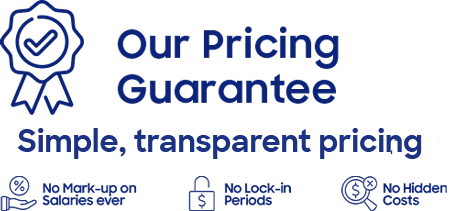Outsourcing Payroll: How Is It Good for Your Business?
What is payroll outsourcing?
The payroll process is a critical part of the business that needs time, focus, and expertise, things that can be difficult to find when you are a small or medium business juggling too many tasks all at once. In a bid to solve this problem, many companies chose to tap the services of a trusted payroll outsourcing provider – a move that would prove to be strategic and cost-efficient in the long run.
Payroll is usually managed by two departments – the human resource and accounting departments. This is because the payroll process has two aspects to it – first is the process that involves tracking work hours, calculating the pay, and distributing the salary to the employees; second is the accounting and record-keeping functions, which includes setting aside funds for medical benefits, social security, and more.
Delivering timely and accurate pay to the employees is critical to retention, pushing companies to either develop their own payroll managing software or acquire third-party management software solutions. Employees use this software to clock in and clock out, as well as file leaves and schedule adjustments. The employers, meanwhile, use this to track the work hours and calculate the pay.
Some companies have the luxury to have their own payroll division that can focus solely on the tedious process. However, for many businesses, payroll is just a part of the tasks of the human resource and accounting departments that both have other important business matters to attend to. Juggling too many tasks would many times result in salary discrepancies, leaving many employees disgruntled.
Overall, developing or purchasing management software solutions while creating an in-house payroll division can deal a huge blow to a company’s budget, especially for the small and medium businesses that are trying to be competitive in their respective markets. Moreover, looking for qualified people to streamline the payroll process can be difficult in this time of global talent shortage. These are the gaps that payroll outsourcing looks to fill in.
Payroll outsourcing is a solution wherein a company engages a third-party provider to handle both administrative and compliance tasks that are connected to its employee’s salary, such as wage calculation, tax deductions, printing and sending checks, payroll policies implementation, tracking and reconciliation of payment records, the management and solution of pay discrepancies, employment contribution payments, and many more.
Reasons to outsource payroll
Different businesses have varying pain points that led them to outsource. But there are 7 common reasons why many companies across industries have chosen to partner with a payroll outsourcing provider.
1. Save valuable time
Having a dedicated outsourced payroll team allows the in-house team to focus on the other important business tasks. By delegating activities, like calculating payroll, government remittances, and distributing paychecks, the core team can centre their attention on other aspects of the business that directly affects growth.
2. Minimize errors
Without any other business tasks to worry about, your dedicated outsourced payroll team can put their 100 percent focus on every detail of the payroll process. Moreover, payroll outsourcing providers allow companies to access their management platform to automate certain aspects of payroll that can further lessen the risk for errors.
3. Ensure compliance
Part of the core business tasks of payroll outsourcing providers is to regularly update and refresh your team on the changing government regulations and tax rates in your jurisdiction. Partnering with a reputable provider gives you peace of mind that all paychecks are accurate, timely, and compliant with the current policies.
4. Boost security
Professional payroll outsourcing providers invest heavily in security with a strong emphasis on data protection. By partnering with an experienced provider, you get access to an enterprise-grade security system that could be costly if purchased in-house. This security system will protect you from risks, like identity theft, tampering, and embezzlement, among others.
5. Integrated data solutions
Payroll outsourcing providers will let you access their technology, like managing platforms, that integrate all payroll-related data. A centralised system where employees can clock in, file leaves, and adjust schedules will make it easy for you and your team to track work hours, calculate pay, and approve their requests, no matter where everyone is.
6. Access to qualified talent
Managing payroll processes require expertise. But with many companies having the same needs, it may be difficult to find and get qualified talent. Payroll outsourcing providers, however, allow you to access their existing pool of trained and certified experts who are ready to integrate with your business culture and processes.
7. Reduce cost
Payroll outsourcing providers source their talent from countries with lower labour costs, like the Philippines, giving you massive savings compared to building your own payroll team. Many companies have gained at least 70% in overhead costs just by partnering with an offshore provider in Manila – the very definition of cost-efficiency.
In-house vs outsourced payroll
There are many misconceptions about outsourcing payroll that have companies thinking twice about engaging even the most trusted providers. Among the issues that have kept some businesses from keeping their payroll process in-house are security and control over sensitive company data.
However, current outsourcing models have resolved these issues that stemmed from the traditional models. For starters, payroll outsourcing providers follow international security standards. Furthermore, modern technology and outsourcing models allow companies to customise access points and access levels on sensitive company data.
Even the workspaces provided by the outsourcing partners have adapted to the times, with CCTV cameras, monitored alarm systems, multiple redundancies, and private and secured storage for your backup data, up to date firewalls and antivirus software, and more. Moreover, the company is allowed to customise all security measures to suit their needs.
Overall, the decision on what part of the payroll process to outsource depends on your need. If the pain point is more on record-keeping, you can choose to outsource this specific task alone, while keeping the rest in-house. Some businesses with seasonal peaks would also engage providers only for a specific period when they need it most.
Outsourcing is a very flexible solution to problems concerning any business process. There is nothing wrong with combining the best of both worlds and having an in-house and an outsourced payroll team can definitely work to your advantage if that is what solves your company’s pain points.
Choosing the right provider
Payroll outsourcing is a business solution built to address your problems. But to make the most out of it, you need to choose the right provider. This can be daunting for some companies, especially those without experience in the outsourcing industry. However, if you look at it closely, choosing the right outsourcing provider is just about knowing what you really need.
1. List down your pain points
You would not be able to choose the right partner if you have no clear view of the specific problems you need to address. The first step in looking for a payroll outsourcing provider is to list down your pain points and reasons for outsourcing. Look for a partner that can check all the boxes when it comes to your specific needs.
2. Check compliance capabilities
Because outsourcing involves building a team from another territory, you need to ask potential partners about the capability of their talent to understand your jurisdiction’s laws and tax regulations. You can also ask a provider to include certifications as a requirement for the roles you need to ensure that you get people that know and understand your territory’s laws.
3. Discuss security requirements
Talk with the outsourcing provider’s IT security head to discuss your security requirements. Make sure the provider has international certifications. Ask about how payroll data is transmitted stored, secured, and accessed. Ask about physical office security and policies to ensure no data is leaked. Find a partner that will allow you to choose access points for sensitive data.
4. Look for existing audits
Reputable outsourcing providers allow themselves to be audited by independent reviewers. Do not hesitate to ask about existing audits because this will give you deep insight into how they work with their clients. Independent audit also allows you to gauge if the outsourcing provider is the right fit for your business goals.
5. Read company reviews
Online job platforms, like Glassdoor and Indeed, let employees evaluate outsourcing companies. Look for the ones with higher ratings because it means they are doing something right in retaining their staff. Happy staff means higher productivity, and higher productivity always means good business.
READ MORE: 7 Reasons Why Businesses Outsource to the Philippines
Pros and cons of outsourcing payroll functions to the Philippines
When looking for the best payroll outsourcing providers, many companies find themselves looking at companies in the Philippines for many good reasons. But instead of diving head on into the Philippine outsourcing market, the best move is to study it first and make sure you know the advantages and disadvantages for your business.
The pros
A nation of accountants
Accountants are highly regarded in the Philippines, and a lot of families would want their children becoming certified public accountants. This is the reason why the Philippines produces nearly 200,000 CPAs a year. And even while preparing for the CPA exams, Filipino accountants are already able to work with top firms that cater to global audience, giving them some much needed experience and exposure.
CPAs in the Philippines are also constantly trained, especially when they work with accounting agencies that have national and international clients. Because of consistent practice and continuous training, Filipino accountants are very adaptable when it comes to the compliance and regulations of other jurisdictions.
Filipino accountants are also proficient with the top accounting software, such as QuickBooks and Xero. They may need to learn a thing or two with these tools to serve you better, but because of their background, it will be quick and seamless. It is safe to say that when you outsource payroll functions to the Philippines, you get experienced certified professionals with proper training and room for growth.
A strong accounting industry
The Philippines is home to one of the oldest professional accountancy bodies in Asia – the Philippine Institute of Certified Public Accountants, which was founded in 1929. In fact, the accounting industry in the Philippines is heavily influenced by American standards, but it slowly found its own form throughout the years.
Accounting in the Philippines has a strong global orientation. For one, the country’s top universities offer accounting programs that tackle current global trends, making fresh graduates ready to take on internationally oriented entry roles right of the bat. Filipino CPAs are even highly utilized in the diverse ASEAN region, making them very adaptable and quick to learn various standards and regulations.
Excellent communication and seamless cultural adaptability
What makes the Filipino workforce distinct from other markets is its almost native English-speaking skills. English is one of the country’s two primary languages, and it is being taught from kindergarten to college. Throughout the years, Filipinos have adopted English with neutral accent, using it as an official language both in school and at work.
Aside from the language, the Philippines has a diverse heritage influenced by Malay, Chinese, Hindu, Arab, and Polynesian roots before the Spanish and Americans came. In the modern times, Filipinos have been exposed to foreign cultures through pop culture media and its overseas workers spread throughout the globe.
The high exposure to multiple cultures around the world has made Filipinos highly adaptable to foreign influence, especially to western countries. You may need to brief your Filipino team members about certain English vernaculars and cultural eccentricities, but rest assured that they will ease into your culture quickly.
The cons
It comes with a price
The cost of outsourcing payroll functions to the Philippines may be slightly higher compared to other markets, such as India, Egypt, and Indonesia. But it is still very low when you compare it to the cost of outsourcing payroll to onshore or nearshore markets. Moreover, the cost is still very low when you compare it to doing it all on your own.
What you supposedly lose to a slightly higher cost when outsourcing payroll functions to the Philippines, you take back more than double with the quality of talent, infrastructure, and support you get. If you do all the math, cheap when outsourcing payroll may even cost you more especially when the talent you get does not fit your business.
Outsourcing is not just solely for the purpose reducing cost, it is also a solution that will make your business to function more efficiently. You got to find that balance between pricing and quality when you outsource payroll functions in order to make the most out of this business solution. Outsourcing works, but only if you make it work for you.
Data security
Threats to data security is a top concern for companies when outsourcing, not just to the Philippines, but even to other countries. The Philippines may have standards and policies on data security that is different from the US, the UK, Australia, or Canada, which can be a cause of worry, especially because payroll functions involve sensitive company data.
However, the Philippines has already passed the Data Privacy Act of 2012, a law that essentially aligns data security standards with international standards. There may be a few differences here and there, but generally the data security in the Philippines is up to par with global standards.
Moreover, there are outsourcing firms in Manila that offer customizable IT and security solutions that allows companies to choose the type of security they want for their offshore team. From office security, hardware, software, and even IT support and infrastructure, companies are given the option to secure their processes the way they want it.
Compliance and tax jurisdictions
Payroll is a complex process, especially when you operate in different jurisdictions. The difference in compliance rules and tax regulations can be confusing. Some companies fear that outsourcing to the Philippines would be hard as because the offshore team would be doing payroll for a different country with different policies.
While it is true that there could be a learning curve, Filipino accountants are very adaptable when it comes to learning new regulations beyond their jurisdictions. Their global exposure through their studies and experience allows them to quickly learn new regulations, so they can work for a client no matter what country they are.
It may take some training, but outsourcing providers are there to make the transition smooth seamless, and, as much as possible, quick. After all, training has always been a part of onboarding people, and outsourcing is not a magic cure-all solution, but an investment that takes time and effort before it flourishes.
Understanding the pros and cons of outsourcing payroll functions to the Philippines should help you determine the right outsourcing provider for your business. While the cons may sound daunting, most outsourcing partners have solutions to remedy these supposed disadvantages. All you have to do is take some time for research, schedule consultations, and ask as many questions as you need.














